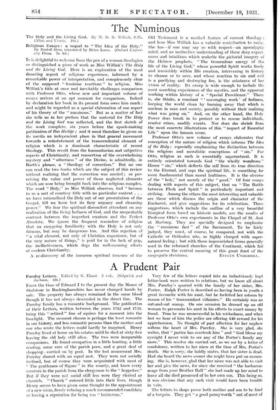The Numinous
The Holy and the Living God. By M. D. R. Williuk, S.Th. (Allen and Unwin. 10s.)
IT is delightful to welcome from the pen of a woman theologian so distinguished a piece of work as Miss Willink's The Holy and the Living God. Here is an exploration of the most daunting aspect of religious experience, informed by a remarkable power of interpretation, and conspicuously clear of the supposed "feminine reactions" to religion. Miss Willink's title atonce and inevitably challenges comparison with Professor Otto, whose new and important volume of essays arrives at an apt moment for comparison. Indeed by declaration her book in its present form owes him much ; and might be regarded as a special elaboration of one aspect of his theory of the "numinous." But as a matter of fact she tells us in her preface that the material for The Holy and the Living God was collected, and the first sketch of the work complete, six years before the epoch-making publication of Des Heilige ; and it must therefore be given on its merits an independent place in that general movement towards a reinstatement of the transcendental element of religion which is a dominant characteristic of recent theology. This revolt from the humanitarian and subjective aspects of Christianity, and reassertion of the overwhelming mystery and " otherness " of the Divine, is admittedly, in Barth's phrase, a "theology of correction." But no one can read the two books which are the subject of this review without realizing that the correction was needed ; or per- ceiving the value and power of those neglected elements which are now being brought back into the religious complex. The word "Holy," as Miss Willink observes, had "become to us a sort of courtesy title with no particular content . . . we have rationalized the Holy out of our presentation of the Gospel, till we have lost its fiery urgency and cleansing power." We fear the spiritual discomfort attendant on any realization of the living holiness of God, and the unspeakable contrast between the imperfect creature and the Perfect Absolute. We ignore the frequent reminders of religion that an easygoing familiarity with the Holy is not only fatuous, but may be dangerous too. And this rejection of "a vital element, not only of Christian experience, but of the very nature of things," is paid for in the lack of grip, the ineffectiveness, which dogs the well-meaning efforts of modern Christianity.
A re-discovery of the immense spiritual treasure of the
Old Testament is a marked feature of current theology: and here Miss Willink has a valuable contribution to make. She has—if one may say so with respect—an apocalyptic mind, and an instinctive understanding of those deep experi- ences and intuitions which underlie the pictorial imagery of the Hebrew prophets. "The tremendous energy of the life of the Living God," whose powerful Spirit works freely and irresistibly within His creation, intervening in history to cleanse or to save, and whose reaction to sin and evil is a purifying and destroying fire, is the substance of her vision of reality. Its sweep is wide enough to include the most searching experiences of the mystics, and the apparent working within history of a "Special Providence." There is, she thinks, a constant "'scavenging work of holiness, keeping the world clean by burning away that which is unclean in man and society, possibly without their realizing what was going on." And, on the other hand, the Holy Power does break in to protect or to rescue individuals, resolve crises, modify events. Nor does the shrink froth the most concrete illustrations of this "impact of Essential Life" upon the human scene.
Professor Otto's new volume of essays elaborates that conception of the nature of religion which informs The Idea of the holy; especially emphasizing the distinction between the religious and moralistic conceptions of "sin." For Otto, religion as such is essentially supernatural. It is entirely orientated towards God "the wholly wondrous." Hence "sin," which deflects the self from its true direction to the Eternal, and saps the spiritual life, is something far more fundamental than moral faultiness. It is the obverse of the "holy," not merely of the "good." Of four essays dealing with aspects of this subject, that on "The Battle between Flesh and Spirit" is particularly important and striking. Among the others the most interesting and valuable are those which discuss the origin and character of the Eucharist, and give suggestions for its celebration. These suggestions, Which include the outline of a very beautiful liturgical form based on historic models, are the results of Professor Otto's own experiments in the Chapel of St. Jost at Marburg. They are specially designed to emphasize the " ntuninous fact" of the Sacrament. To be fairly judged, they must, of course, be compared, not with the Catholic or Orthodox rite, so highly charged with super- natural feeling ; but with those impoverished forms generally used in the reformed churches of the Continent, which fail to preserve the central meaning of this great feast of the


































 Previous page
Previous page